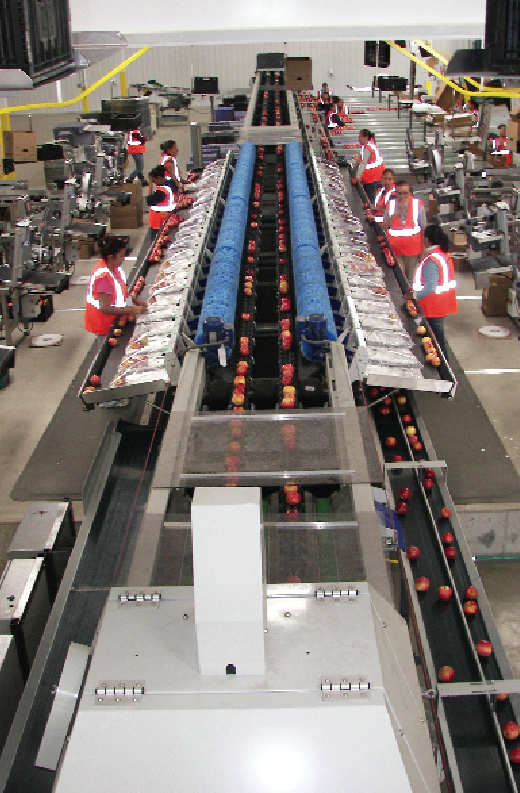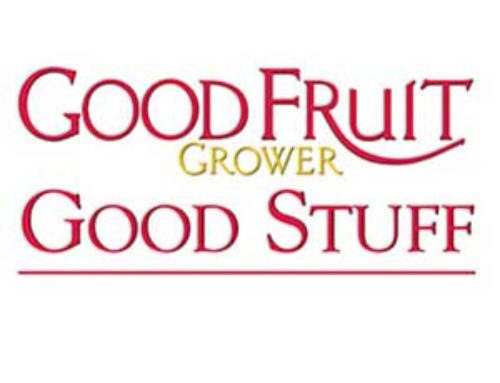 Last year, Riveridge Produce Marketing, Inc., sold about a third of all the apples produced for wholesale fresh-market sale in Michigan, about 3.5 million boxes. Don Armock, president of the company located on Fruit Ridge a few miles north of Grand Rapids, figured the number was 36 percent last year.
Last year, Riveridge Produce Marketing, Inc., sold about a third of all the apples produced for wholesale fresh-market sale in Michigan, about 3.5 million boxes. Don Armock, president of the company located on Fruit Ridge a few miles north of Grand Rapids, figured the number was 36 percent last year.
Nearly half of Michigan’s 20-million-bushel average crop of apples still goes into processed products, but Riveridge is the state’s largest seller of apples for fresh market. In August, the company entered the apple packing business, working from a newly renovated 72,000-square-foot facility equipped with state-of-the-art Compac InVision 5000IR sorting equipment from New Zealand.
The machines include a four-lane presorting line (the only one in Michigan) and a two-lane packing line. Both use infrared radiation and multiple cameras to sort fruit by size, color, weight, shape, blemishes, internal characteristics, pressure, and for Brix and soluble solids, qualities related to flavor.
Riveridge bought the facility last year from Alpine Apple Haus and renamed it Riveridge Packing, a new division of the company. The revitalized packing house is located just a few hundred feet from entry into Michigan’s freeway system. The receiving area has refrigerated storage where apples await entry to the water flume that carries them to the four-lane presorter.
A new dumping system uses a forklift that handles two bins at a time, gently dumping them into the flume rather than lowering the bin and floating apples out. After sorting and packing, boxes of apples move on a conveyer down into a tunnel under the floor to emerge 50 feet away into the adjacent storage and shipping area. The under-floor conveyor opens floor space for easy movement of people and equipment.
Sales agent
Riveridge started in business in 1990 as a sales agent for fresh-market apples, just at a time when the state was beginning to shift away from its heavy reliance on apples for processing. Riveridge was a leader providing an opportunity for enterprising apple growers to plunge deeper into fresh apples, a market that was growing with exciting new varieties while the market for processing apples was faltering.
The company rode this new wave, becoming a sales agent for these fresh apples and about 100 of the state’s largest growers. Packing was done by six packing houses; Riveridge handled sales and did not own packing or storage facilities until this year. Interestingly, however, it did enter the fruit-growing business, buying an orchard in 1994 (see “Riveridge plans to try direct marketing” on page 30 of this issue).
Alpine Apple Haus was owned by five west Michigan apple growers and was one of those packing houses for which Riveridge sold apples. After two of the Apple Haus partners died, the remaining owners sold the company to Riveridge. “The packing equipment was about 15 years old,” Armock said. “It was still usable, but we decided to upgrade our capability to serve our customers better, and growers’ needs have changed, too. We sell a fair amount of Honeycrisp, which can have problems with internal browning, rots, and watercore.
By being able to detect these internal defects, we can sell customers a product they can feel confident in,” he said. “At the same time, we can get a better packout for growers from lots that have these issues. We can sort them cost-effectively and pack the good apples. We can pack as good a pack as anybody in the industry.” The new plant also addresses a couple of other issues.
“We wanted to create a great place to work—clean, quiet, with jobs made easier by technology,” he said. “With labor issues, we need to make year-round jobs that workers want to keep year after year.” That means having a sales and packing system that operates all year. Packing of the 2009 crop didn’t end until August for Riveridge. About 45 people work in the plant, and they have virtually year-round employment.
The packing line can be used to presize or otherwise segment fruit for return to bins for storage and packing later—making better use of storage by eliminating early the apples that won’t make it into fresh pack. With the large Michigan crop in 2009, storage capacity was at a premium.
One other issue addressed by the new facility is the in-plant environment. For many years, buyers have said that Michigan packers don’t get a good wax job, that Michigan apples have a duller, mottled finish, Armock said. He believes the humid conditions in Michigan prevent the wax from drying evenly into that glossy shine buyers want. A new waxing tunnel that dries apples before and after waxing addresses the problem.
Red Prince
Armock is known as an innovative marketer. Last year, Riveridge took on a club variety, Red Prince, that is produced solely by one large grower, Marius Botden, in Thornbury, Ontario, Canada, about 200 miles away. The bright red apple originated in Germany, and Botden bought the exclusive rights to grow it.
“It’s a variety that benefits from storage,” Armock said. “So we introduced it for marketing in January to May, a time when there is less noise in the market after the fall harvest and sales.” Riveridge introduced Red Prince last year and sold about 30,000 boxes, an amount that Armock expects will double this year and increase further after that. The grower has lots of young trees in the ground and is planting more.
It was quite an educational experience, Armock said, figuring out how to get customers to buy the new variety and retailers to make shelf space for it. The publicity campaign included a Twitter feed and other social networking—and a few were sent, on red velvet cushions, to journalists. Armock and his two business partners have deep roots on the Ridge, but none was an heir to a family orchard or packing business.
They were working for other companies when they decided to strike out on their own. His partners, both of whom are active in the day-to-day business, are Rog Geers, who works in sales, and Dan Rock, who works in accounting. Denise Donohue, executive director of the Michigan Apple Committee, said Armock travels the world to learn about apple growing in other regions. “He is committed to driving competition and works hard to keep his business on the cutting edge.” •




Leave A Comment